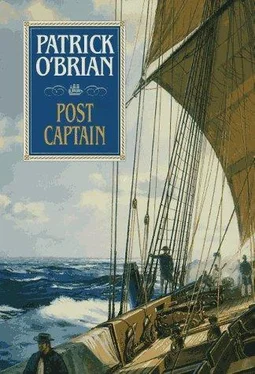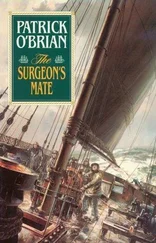Patrick O'Brian - Post captain
Здесь есть возможность читать онлайн «Patrick O'Brian - Post captain» весь текст электронной книги совершенно бесплатно (целиком полную версию без сокращений). В некоторых случаях можно слушать аудио, скачать через торрент в формате fb2 и присутствует краткое содержание. Жанр: Книги. Описание произведения, (предисловие) а так же отзывы посетителей доступны на портале библиотеки ЛибКат.
- Название:Post captain
- Автор:
- Жанр:
- Год:неизвестен
- ISBN:нет данных
- Рейтинг книги:5 / 5. Голосов: 1
-
Избранное:Добавить в избранное
- Отзывы:
-
Ваша оценка:
- 100
- 1
- 2
- 3
- 4
- 5
Post captain: краткое содержание, описание и аннотация
Предлагаем к чтению аннотацию, описание, краткое содержание или предисловие (зависит от того, что написал сам автор книги «Post captain»). Если вы не нашли необходимую информацию о книге — напишите в комментариях, мы постараемся отыскать её.
Post captain — читать онлайн бесплатно полную книгу (весь текст) целиком
Ниже представлен текст книги, разбитый по страницам. Система сохранения места последней прочитанной страницы, позволяет с удобством читать онлайн бесплатно книгу «Post captain», без необходимости каждый раз заново искать на чём Вы остановились. Поставьте закладку, и сможете в любой момент перейти на страницу, на которой закончили чтение.
Интервал:
Закладка:
And the wind was still this same nipping breeze out of the north-west. But far over on the larboard bow trouble was brewing: no stars above Castor and Pollux, and the moon was sinking towards a black bar right across the horizon. With a falling glass this might mean a blow from the same quarter - an uncomfortable position, with the shore so close under his lee. ‘I wish it were over,’ he said, begin-fling his ritual pace. His orders required him to be off the headland at three in the morning, to fire a blue light, and to receive a passenger from a boat that should answer his hail with the word Bourbon: he was then to proceed with all possible dispatch to Dover. If no boat appeared or if he were driven off his station by stress of weather, then he was to repeat the operation on the three succeeding nights, remaining out of sight by day.
This was Pullings’ watch, but the master was also on deck, standing over by the break of the quarterdeck, keeping an eye on his landmarks, while the quiet business of the ship went on From time to time Pullings trimmed the sails to keep them exactly balanced, the carpenter’s mate reported the depth of water in the well - eighteen inches, which was more than was right; the master-at-arms made his rounds, the glass turned, the bell rang, the sentinels called ‘All’s well’ from their various posts, the look-outs and the helm were relieved. The watch took a turn at the pumps; and all the while the breeze hummed through the rigging, the sum of the notes rising and falling through a full tone as the ship rolled, her masts straining their shrouds and braces now this side, now that.
‘Look out afore, there,’ called Pullings.
‘Aye-aye, thir,’ came the distant voice. Bolton, one of the men pressed from the Indiaman, a glowering, surly, murderous brute with no front teeth - yellow fangs each side of a lisping gap; but a good seaman.
Jack held his watch to the moonlight: still a long time to go, and now the dark bar in the north-west had swallowed up Capella. He was thinking of sending a couple of men to
the mast-head when the look-out hailed. ‘Upon deck, thir. Boat on the starboard quarter.’
He reached up into the shrouds and swung himself to the rail, searching the dark sea. Nothing. ‘Where away?’ he called.
‘Right on the quarter. Maybe half a point off now. Pulling like hell, three of a thide.’
He caught sight of her as she crossed the path of the moon. About a mile away: very long, very low, very narrow, more like a line on the water: travelling fast towards the land. This was not his boat - wrong shape, wrong time, wrong direction.
‘What do you make of her, Mr Goodridge?’ he asked.
‘Why, sir, she’s one of those Deal shells - death-or-money boats, they call ‘em, or guinea-boats as some say; and by the look of her, she’s got a main heavy cargo aboard. They must have seen a revenue cutter or a cruiser early on, for now they’ve got to pull against the ebb, and it runs cruel hard off the point. Do you mean to snap her up, sir? It’s now or never with the race off the headland. What a bit of luck.’
He had not seen one before, but he knew them by reputation, of course: they were more like racing-craft for a quiet river than anything built to face a sea - every notion of safety sacrificed to speed; but the profit on smuggling gold was so great that the Deal men would take them clean across the Channel. They could run away from anything, pulling into the eye of the wind, and although the men were sometimes drowned, they were very rarely caught. Unless, as it might fall out, they chanced to be right under the lee of a pursuer, hampered by a swift tide, and tired out by their long pull. Or if they ran straight into a waiting man-of-war.
Gold packed very small: there might be five or six hundred pounds for him in that frail shell, as well as seven prime hands, the best seamen on the coast - lawful prize, for their protections would be of no sort of use to them whatsoever now. He had the weather-gage. He had but to fill his foretopsail, pay round, set everything she could carry, and bear down. To run from him she would have to pull dead against the tide, and they would not be able to keep that up for long. Twenty minutes: perhaps half an hour. Yes, but then he would have to beat back again to his station; and he knew the Polychrest’s powers in that direction, alas.
‘There’s the best part of an hour to go before three, sir,’ said the master at his side. Jack held up his watch again; the master-at-arms held his lantern to light it; the listening quarterdeck fell unnaturally silent. They were all seamen aft, but by now even the framework-knitter in the waist knew what was afoot.
‘I only make it seven minutes past, sir,’ said the master.
No. It would not do. ‘Mind your helm.’ snapped Jack as the Polychrest yawed a full point to starboard. ‘Mr Pullings, check the blue lights,’ he said, and resumed his pacing. For the first five minutes it was hard to bear: every time he reached the taffrail there was that boat, drawing in nearer and nearer to the land, but still in extreme danger. After his twentieth turn she had crossed the invisible line into safety: the sloop could no longer cut her off - he could no longer change his mind.
Five bells: he checked their position, bringing the bearing-compass on to the steeple and the tower. The dirty weather in the north-west was skirting the Great Bear now. Six bells, and the blue light soared up, burst, and drifted away to leeward, lighting all their upturned faces with an unnatural emphasis - open mouths, mindless wonder.
‘Mr Pullings, be so good as to send a reliable man into the top with a night-glass,’ said Jack. And five minutes later, ‘Maintop, there. What do you see? Any boat pulling from under the land?’
A pause. ‘Nothing, sir. I got the line of surf in my glass, and nothing ain’t pulled off yet.’
Seven bells. Three well-lit ships passed out at sea, running down the Channel - neutrals, of course. Eight bells, and the changing watch found the Polychrest still there. ‘Take her out into the offing, Mr Parker,’ said Jack. ‘Sink the land entirely, making as little southing as ever you can. We must be here again tomorrow night.’
But the Polychrest spent tomorrow night on the other side of the Channel, lying to under Dungeness, shipping such seas that Jack thought he should have to run for the shelter of the Isle of Wight, and report back to the admiral with his tail between his legs, his mission unaccomplished; but the wind chopped round westwards at dawn, and the sloop, pumping hard, began to creep back under close-reefed topsails across the angry water - a sea so short and steep that she proceeded by sickening and often unpredictable jerks, and in the gun-room no amount of fiddles or ingenuity on the parts of the diners would keep their food on the table.
The purser’s place was empty, as it usually was as soon as the first reef was taken in; and Pullings was dozing as he sat.
‘You do not suffer from the sea-sickness, sir?’ said Stephen to Macdonald.
‘Why, no, sir. But then I come from the Western Isles, and we are in boats as soon as we are breeched.’
‘The Western Isles . . . The Western Isles. There was a Lord of the Isles - of your family, I presume, sir?’ -Macdonald bowed. ‘And that always seemed to me the most romantic title that ever was. We, indeed, have our White Knight, and the Knight of the Glen, the O’Connor Don, the McCarthy Mor, O’Sionnach the Fox, and so on; but the Lord of the Isles. . . it gives a feeling of indeterminate magnificence. That reminds me: I had the strangest impression today - an impression of time recovered. Two of your men, both by the name of Macrea, I believe, were speaking privately, furbishing their equipment with one piece of pipeclay between them as I stood near them -nothing of any consequence, you understand, just small disagreement about the pipeclay, the first desiring the second to kiss his arse and the second wishing the soul of the first to the Devil and a good deal more to the same effect. And I understood directly, without the least thought or conscious effort of will!’
Читать дальшеИнтервал:
Закладка:
Похожие книги на «Post captain»
Представляем Вашему вниманию похожие книги на «Post captain» списком для выбора. Мы отобрали схожую по названию и смыслу литературу в надежде предоставить читателям больше вариантов отыскать новые, интересные, ещё непрочитанные произведения.
Обсуждение, отзывы о книге «Post captain» и просто собственные мнения читателей. Оставьте ваши комментарии, напишите, что Вы думаете о произведении, его смысле или главных героях. Укажите что конкретно понравилось, а что нет, и почему Вы так считаете.












